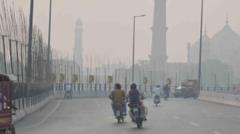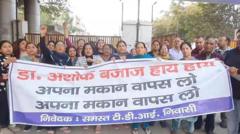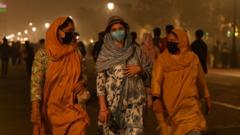In response to unprecedented air pollution in Lahore, Pakistan, authorities have closed all primary schools for a week and instituted remote work measures for office staff as the city struggles with hazardous air quality.
Lahore Schools Close Amid Record Pollution Crisis

Lahore Schools Close Amid Record Pollution Crisis
Authorities in Lahore impose a "green lockdown" as pollution levels spike, prioritizing children’s health.
Authorities in Lahore, Pakistan, have taken drastic measures to protect public health as the city faces alarming air pollution levels. As of Monday, all primary schools are closed for one week, and 50% of employees in government and private sectors are mandated to work from home under a newly implemented "green lockdown" plan. This initiative aims to reduce exposure to the toxic smog that has enveloped the city, which has consistently ranked as one of the most polluted in the world.
Senior Minister Marriyum Aurangzeb expressed concerns over the severity of the smog, stating that masks should be compulsory for children when they return to school. The air quality index in Lahore soared above 1,000, far surpassing the "dangerous" threshold of 300 set by the World Health Organization, raising alarm among health experts regarding the severe consequences of inhaling such toxic air.
Raja Jehangir Anwar, a prominent figure in Lahore's environmental sector, pointed to the burning of crop residue across the border in India as a key contributor to the worsening situation. Aurangzeb highlighted the need for dialogue with India to address cross-border pollution, noting that the prevailing winds have exacerbated the air quality crisis.
Authorities are urging residents to remain indoors, with water spraying trucks deployed to aid in clearing the air. Construction activities have been suspended in certain areas, and a reassessment of the situation is scheduled for next Saturday to determine if school closures should extend beyond the current limit.
As the health risks of breathable toxins become clearer, families, particularly concerned parents like Lilly Mirza, express growing anxiety over the implications of the persistent smog. With previous years' pollution levels not as severe, there is a palpable sense of urgency for accountability and action to mitigate this environmental disaster.
Historically, Lahore's air quality has deteriorated during the winter months, as cold air traps pollutants, contributing to a crisis that affects health outcomes, leading to increased rates of strokes, heart diseases, lung cancer, and severe respiratory issues. In light of current conditions, access to outdoor activity for students has already been restricted until January, illustrating the ongoing struggle to protect vulnerable populations.




















